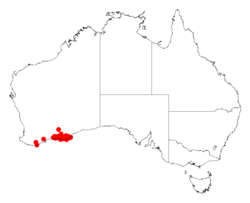Biology:Acacia pachyphylla
| Acacia pachyphylla | |
|---|---|
| Scientific classification | |
| Kingdom: | Plantae |
| Clade: | Tracheophytes |
| Clade: | Angiosperms |
| Clade: | Eudicots |
| Clade: | Rosids |
| Order: | Fabales |
| Family: | Fabaceae |
| Subfamily: | Caesalpinioideae |
| Clade: | Mimosoid clade |
| Genus: | Acacia |
| Species: | A. pachyphylla
|
| Binomial name | |
| Acacia pachyphylla Maslin
| |

| |
| Occurrence data from AVH | |
Acacia pachyphylla is a shrub belonging to the genus Acacia and the subgenus Phyllodineae that is endemic to south western Australia .
Description
The low, spreading and pungent shrub typically grows to a height of 0.1 to 0.3 metres (0.3 to 1.0 ft).[1] It has multiple glabrous stems with light grey coloured branchlets that are a reddish colour toward the extremities and has persistent stipules that are 1.5 to 3 mm (0.059 to 0.118 in) in length. Like most species of Acacia it has phyllodes rather than true leaves. The grey-green phyllodes are dimorphic on the upper branches and are 1 to 3 mm (0.039 to 0.118 in) in width. On the lower branches the thickly coriaceous phyllodes are caducous with an oblanceolate shape and have a length of 2 to 7 mm (0.079 to 0.276 in) and are 1 to 7.5 mm (0.039 to 0.295 in) wide.[2] It blooms from October to December and produces yellow flowers.[1] The rudimentary inflorescences occur singly on a raceme with a 0.5 mm (0.020 in) long axis with spherical flower-heads that have a diameter of 6 to 8 mm (0.24 to 0.31 in) and contain 36 to 53 golden coloured flowers. The seed pods that form after flowering are not constricted between each of the seeds. The hard and bony pods are up to 8.5 cm (3.3 in) in length and 6 to 8 mm (0.24 to 0.31 in) wide and are covered in a fine white powdery coating. The dull dark brown to black coloured seeds inside the pods have an oblong to broadly elliptic shape with a length of 4.5 to 5 mm (0.18 to 0.20 in) and a terminal cap shaped aril.[2]
Distribution
It is native to an area along the south coast in the Goldfields-Esperance region of Western Australia where it is commonly situated on flat or undulating sandplains or along the margins of salt lakes growing in sandy soils over or around limestone[1] or sandy-loamy, clay or gravelly soils The bulk of the population is found from around Young River in the west to around Israelite Bay in the east and extending as far north as 130 km (81 mi) where it is often a part of open shrub mallee over heathland communities.[2]
See also
References
- ↑ Jump up to: 1.0 1.1 1.2 "Acacia pachyphylla". FloraBase. Western Australian Government Department of Parks and Wildlife. https://florabase.dpaw.wa.gov.au/browse/profile/16138.
- ↑ Jump up to: 2.0 2.1 2.2 "Acacia pachyphylla Maslin". Wattle - Acacias of Australia. Lucid Central. https://apps.lucidcentral.org/wattle/text/entities/acacia_pachyphylla.htm. Retrieved 18 July 2020.
Wikidata ☰ Q9567683 entry
 |

